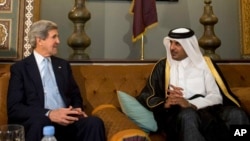With American jets launching bombing raids on militant targets in Iraq and Syria from one of its bases, Qatar is playing a crucial role in the U.S.-led coalition against the Islamic State group. Doha also provides logistical support for the effort and expresses a strong backing for Washington’s efforts.
But Qatar’s Arab neighbors have long maintained that Doha is also destabilizing the region and working against U.S. interests with its ties to al-Qaida-linked Nusra Front in Syria, Hamas in the Gaza Strip and the Taliban in Afghanistan.
Qatar’s new leadership may be trying to alter that image, but it is working against a powerful legacy.
Much of Qatar’s foreign policy has been the brainchild of former leader Sheikh Hamad bin Khalifa al-Thani. During his tenure as emir from 1995 until last year, the tiny gas and oil-rich country adopted an ambitious world view, becoming a major diplomatic mediator, a generous donor of foreign aid and a regional political player.
Qatar’s ambassador in Washington, Mohamed al-Kawari, said his country is trying to be on the right side of history with its diplomatic stances, including supporting Islamists during the Arab Spring.
“Qatar stood from the very beginning with the Arab people, because if we have the choice between supporting repressive regimes or the people, Qatar chooses people’s side,” Kawari told a gathering of Arab American intellectuals recently at the Al-Hewar Center in Virginia.
But Gregory Gause, a professor of international affairs at Texas A&M University, says Qatar’s diplomacy is based on the personal ambitions of the former emir and his cousin, the prime minister.
“They wanted to take Qatar’s wealth and make Qatar an international brand and a voice in regional politics,” Gause said. “This has very little to do with an understanding of Qatar’s national and global interests."
Analysts say Qatar’s stance on the Arab Spring was based on the assumption that Arab populations would want new leaders who adhered to political Islam, such as the Muslim Brotherhood. Qatar moved from being a neutral mediator to become a major player in attempting to shape events in Egypt, Tunisia, Libya and Syria.
“Qatar and its Al-Jazeera [television] network found themselves in a strong position to influence events and opted to encourage revolutions,” said Paul Salem, an analyst at the Middle East Institute for Policy and Research in Washington.
“When Muslim Brotherhood parties won elections in Egypt and Tunisia, Qatar thought this is a winning trend in the region,” said Salem. “But it ended up being the loser especially with the military coup that ousted them in Egypt.”
By 2013, Qatar found itself in deep conflict with Saudi Arabia and the United Arab Emirates for its continuous support of the Muslim Brotherhood in Egypt and Libya. The two countries withdrew their ambassadors from Doha earlier this year.
As Sunni Muslim rebel groups began to form in Syria against President Bashar al-Assad, Qatar supported them with millions of dollars and provided weapons and supplies. Again the Qataris opted to fund the groups with a religious ideology including the Nusra Front, which the U.S. lists as a terrorist organization.
But the rise of IS militants in the region has led to a re-evaluation on Qatar’s part, some analysts say.
“After the rise of ISIS, the U.S. started to put pressure on the Qataris to stop their support for any kind of groups that were on the more Salafi Jihadist side and I think Qatar is responding to that,” Gause said.
Qatar is hosting a large U.S. command center at al-Udeid Air Base as a home for about 8,000 American military personnel and dozens of U.S. Air Force jets.
“Qatar houses the largest American military base in the Middle East and the Qataris believe that with it their fundamental security issues are taken care of,” Gause said.
That security, analysts say, allows Qatar to branch out and try to maintain good relations with other parties in the region, even those with an anti-U.S. bent.
“From the Qatari perspective, they felt that one of their advantages is to have good relations even with players that the U.S. and others can’t have relations with,” Salem said.
Qatar has been able to maintain good ties with Iran and Hamas in Gaza. It has permitted the Afghan Taliban to establish a political office in Doha. And Qatar has helped as a regional mediator in Lebanon and Sudan.
Salem says that role has helped and not hindered U.S. interests.
“Qatar was very helpful in mediating the release of a U.S. soldier who was captured by the Taliban,” he said. “Qataris were key in releasing an American captive held by radical groups in Syria.”
Salem conceded “this is perhaps a risky policy that caused a lot of complaints from the U.S. and other regional players.”
Some experts say there may be some diplomatic repositioning on Qatar’s part following the transition of power last year from the ruling father to his son Sheikh Tamim.
“The new emir is recalibrating, not abandoning all the old relationships, but trying to bring Qatar back to the center,” Salem said. “A big part of that is a realization that Qatar has gone too far from its [Arab Gulf ] neighbors and that Qatar’s policies have went too far.”
Qatar recently asked seven senior Egyptian figures from the Muslim Brotherhood movement to leave the country - a sign that maybe Qatar is changing its stance.
But analyst Gause said there needs to be more signals of a major strategic shift.
“It is a tactical move,” Gause said. “I don’t see this as the beginning of a huge change in Qatar’s policy. It is rather an immediate reaction to the pressure from Saudi Arabia and the UAE.”
Qatar’s ambassador in Washington said that Doha will continue to evaluate its diplomatic options.
“Qatar still believes in political inclusion and pluralism, that is why it is promoting this kind of political culture in the Arab world,” he said.




